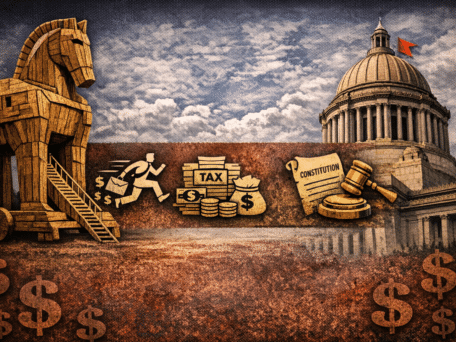Media outlets and $15 minimum wage supporters are using the latest results of a study commissioned by the City of Seattle — and completed by a University of Washington (UW) research team — to boast of the success of the new wage law in Seattle.
However, celebrating the $15 minimum wage based on the results of the report is foolish — mainly because there is little to actually celebrate in the report that supports their argument for jacking up the minimum wage statewide.
We already know that — according to Jacob Vigdor (the professor leading the study) — the $15 minimum wage “picks winners and losers.” Consequences include higher youth unemployment, an increase in grocery, retail and rent prices, cutting worker hours, and reducing benefits.
Liberals are celebrating the study because it reveals that Seattle’s lowest wage workers are earning slightly more than they were before the $15 minimum wage law took effect. But, of course, that’s not the whole story revealed by the report.
Advocates of the $15 minimum wage leave out the part of the study that says Seattle’s lowest wage workers are “actually doing worse compared to low-wage workers in other parts of the state since the wage law took effect.” In fact, according to the study, Seattle’s low-wage workers are “lagging behind” other cities with less robust economies.
The study also makes it clear that the wage increases are “due more to the region’s booming economy than the actual wage hike itself.”
And, the negative impacts of the wage ordinance far outweigh the positive results (which don’t even have much to do with the $15 minimum wage). The Washington Policy Center:
“Amidst this robust economy, the UW study found the lowest-wage workers in Seattle have suffered reduced hours and lower rates of employment. The researchers note these cutbacks have offset, at least partially, the slight wage gains of those workers. This is exactly what those who opposed the city’s plan to pass a $15 wage law predicted.”
But, the reduced hours are not the only negative impacts revealed by the research. In fact, the results reveal that the “new wage law is directly responsible for lowering the employment opportunities of low-wage Seattle workers—their employment rate is 1.2 percentage points lower than what it would have been without the wage law.”
In Vigdor’s own words: “While the vibrant local economy is boosting employment and incomes up and down the economic ladder, the positive effects of a higher minimum wage are being at least partly offset by cutbacks in hours.”
That, certainly, is not something to celebrate – unless you are on the far-Left, and need a propaganda lift for their job-killing statewide minimum wage initiative on the ballot this fall.




